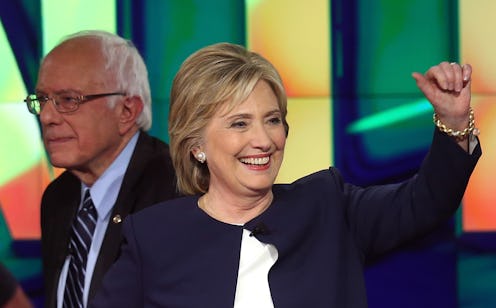News
How Clinton's Voter Data Could Have Helped Sanders
The Democratic National Committee on Friday announced that it had suspended presidential candidate Bernie Sanders from accessing important voter information after Sanders' campaign admitted a staffer had viewed similar confidential information belonging to rival Hillary Clinton in the DNC database. According to a Sanders spokesman, the data was viewable due to a technical error that allowed the staffer, who has since been fired, access to the information through a software glitch. While the staffer responsible for the alleged breach maintained that none of Clinton's data had left the system, the question remained: Hypothetically speaking, if information was stolen, how could Clinton's voter data have helped Sanders' campaign?
To understand the answer, you first have to understand exactly what data was accessed — something that hasn't fully been determined. So far, here's what we know.
According to a report by CNN, which spoke to two senior Democrats close to the investigation on Friday, Josh Uretsky, the Sanders campaign staffer involved with the breach, allegedly ran two searches on the exposed Clinton data, which included a ranking system that placed prospective voters on a scale of 1-100 in terms of likely "turnout, enthusiasm, and support." The two Democrats also alleged that Uretsky had run "multiple searches" in the key states of Iowa, New Hampshire, Nevada, and South Carolina, as well as Florida and Colorado.
According to the report, one of those searches included the phrase, "Show me all the Clinton people rated higher than 60," while the other alleged search included the phrase, "Show me all the people rated less than 30." In layman's terms, both searches would have purportedly provided Sanders' team with the exact information it needed to establish a reliable target audience in the last few weeks before primary voting season.
Sanders' campaign manager Jeff Weaver told reporters on Friday that the breach was unintentional, explaining that a faulty software patch had opened a window between the two campaigns — leaving both Clinton and Sanders' voter data exposed. Weaver claimed that his team had attempted to bring the security glitch to the DNC's attention as far back as October, to no avail.
"We were very concerned that large amounts of our own data was being downloaded and we contacted the DNC to remedy the situation," Weaver said in a press conference on Friday. "We talked to them and we were assured that this was going to be taken care of. But apparently they are not competent in terms of maintaining the security of their data between the campaigns."
According to Weaver, the breach was the direct responsibility of software company NGP VAN, which manages the voter files in the DNC database. "On more than one occasion they have dropped the firewall between the data of competing democratic campaigns," Weaver added on Friday. "This is dangerous incompetence."
DNC chairwoman Debbie Wasserman-Schultz, however, had a different story. "That is just like if you walked into someone's home when the door was unlocked and took things that don't belong to you in order to use them for your own benefit," said Wasserman-Schultz in an interview with CNN's Wolf Blitzer on Friday. "That's inappropriate. Unacceptable."
Still, despite Wasserman-Schultz's qualms, any alleged information Uretsky may have accessed during the breach may not have helped Sanders much in the long run, if the latest Democratic poll numbers are any indication. A Monmouth University Poll released on Wednesday this week showed that little has changed over the past few months — Clinton still has 59 percent of the prospective vote, up just two percentage points since October, and Sanders has continued to hover at around 26 percent. More importantly, the poll showed that a whopping 80 percent of Democratic voters would be either "enthusiastic" or "satisfied" with Clinton as the party's eventual nominee (only 16 percent said they would be "dissatisfied" or "upset" if Sanders lost out to Clinton come primary season).
While it's very possible that Sanders' numbers could turn around and help him win the nomination come spring, it's less likely that the Vermont senator would have been able to use whatever targeted voter data Uretsky may have scraped together to his benefit. For now, the underdog candidate will simply have to cross his fingers, push forward, and hope that the scandal itself doesn't leave too much of a blemish on his otherwise smooth grassroots campaign.
